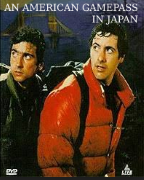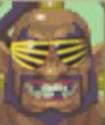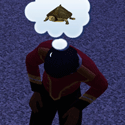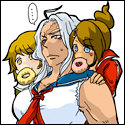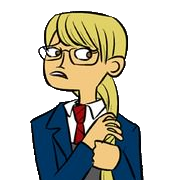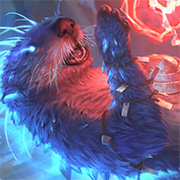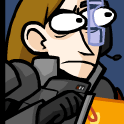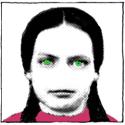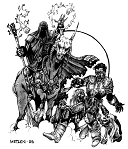|
Halloween Jack posted:Maybe I'm just a huge nerd and nobody cares how a yuppie vampire dodges mandatory 8:00am meetings. I just assume they work remote or work in an international company as a liason between the home office and the local one so their primary working hours are night.
|
|
|
|

|
| # ? Apr 16, 2024 05:59 |
|
Back around the turn of the century*, TFV used its influence to stretch state and federal office hours earlier into the morning and deeper into the evening to avoid unwanted incidents with hemophiliac ENEs until Plan Árvakr and Plan Alsviðr are ready for implementation. This has caused a bunch of spurious rumors that they somehow run the organization. *Serious question, when would being barred from daylight become a serious problem for the urban masquerade?
|
|
|
|
Kavak posted:*Serious question, when would being barred from daylight become a serious problem for the urban masquerade? Anything requiring banking services, for a start. I mean, sure, if you assume everyone is rich enough or does enough volume business to have specialty services for them they'd be fine, but good loving luck being a regular Joe-pire and buying a home when you have to make the wire transfer in person at a bank between the hours of 9-3pm.
|
|
|
|
So historically that'd be...pretty much always.
|
|
|
|
IIRC there's a way to be active during the day REALLY REALLY briefly so you get a wheelchair and something that totally blocks the sun, have your ghoul push you into the bank, then spend the blood point when he tells you it's signing time. Granted this sucks because if any of your enemies show up you are unbelievably hosed. You're also hosed if you have to sign too many things and run out of blood points.
|
|
|
|
Fortunately, the Cheiron Group has Daywalker-brand shade suits for sale!
|
|
|
|
Kavak posted:So historically that'd be...pretty much always. Like I said though, if you assume the Masquerade has some sort of collective financial backing, it would explain why all these Vampires have to interact. They have to pool their needs and resources to afford lawyers and other day-walking humans on retainer to ensure they function as a society, and breaking the Masquerade is punishable by death since if the cops start doing things like investigating into where the finances for Malkavian Industries, LLC is coming from it could result in all the members of the Masquerade getting shut out and likely perishing. Alternately, if you assume VASCU/Task Force Valkyrie exists then Vampires are probably covered under ADA and banks have to legally maintain services for Americans with Type II (Non-Treatable) Vampirism.
|
|
|
|
The Masquerade isn't a group, it's a word used to refer to 'hiding what we are so we don't loving die.'
|
|
|
|
One of the important things about VASCU is that they exist to combat serious personal crimes. Being, for example, an oppressive slumlord isn't technically against the law in a lot of places. Vampires having a lot of money and making life worse for regular people sucks, but it's not the thing that the Vanguard Serial Crimes Unit is here to deal with. A quintuple homicide involving exsanguinated corpses is. FBI agents are here to follow the law. Task Force: Valkyrie is here to kill monsters and they don't give a gently caress how much money you donated to the senator's campaign you pasty-rear end motherfucker.
|
|
|
|
Like I said, everyone always forget The Barrett Commission. They're the Judiciary arm to TFV's Military and VASCU's Law Enforcement.
|
|
|
|
MonsieurChoc posted:Like I said, everyone always forget The Barrett Commission. They're the Judiciary arm to TFV's Military and VASCU's Law Enforcement. I always saw TFV as more CIA than outright military.
|
|
|
|
The Barrett Comission gets forgotten because it's got neither lasers nor psychic Columbos but by god it hits vampires where it hurts: the bank accounts.
|
|
|
|
I assume the Barret Commission mostly does bench trials because for half of the WoD lines I can't imagine the difficulty of getting a jury of the defendants peers gathered.
|
|
|
|
Barudak posted:I assume the Barret Commission mostly does bench trials because for half of the WoD lines I can't imagine the difficulty of getting a jury of the defendants peers gathered. They're not jurors, they're legislators and other people embedded in the political machine, as well as rich lobbyists and major stakeholders of large companies. Their liner quote is "This is my country, my people. If anyone will be using them, it’ll be me."
|
|
|
|
The Barretts have no standing as members of the judicial branch except insofar as some of them are lawyers. They're old-school Republicans, for the most part, or just general lobbyists, who are angry that vampires (and other monsters) are assuming the place that is rightfully theirs: the money behind the throne. So they try to beat the monsters at that game and retake their place of power.
|
|
|
|
Aw, I was all hyped to read about how the government ruled the Camarilla met the criteria for a RICO case and they prosecutors smelled all that blood in the water and are now looking to make their careers by being the one to bag an inner circle member.
|
|
|
|
Half the appeal of being a vampire for me as a teenager/twentysomething was never needing to go out in the day, since everything fun/interesting happened at night. With online banking and all that it's even easier. Or just get a hospitality job to pay cash. Then I got an overnight job and it hurt my brain, but I'm not a real vampire. Though Sydney's lockout laws make more sense as an anti-vampire measure than whatever they were sold as IRL. Closing pubs and nightclubs at 3am and destroying the city's nightlife might barely make sense as a way to stop vampires feeding in the WoD... I'm going to pitch that to my gaming group now.
|
|
|
|
|
Halloween Jack posted:
Hahaha, god no! It was a juryrig homebrew mess, but it was hell of a lot more playable than Everlasting.
|
|
|
|
Groups like this could really stand to have their own little books instead of being a few pages buried in Slashers or whatever.
|
|
|
|
 BOOK TWO: Part Three Or THE THREE ORCMIGOS 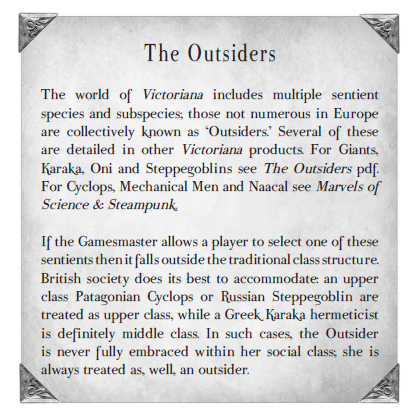 DWARVES The Dwarves of Britain are primarily of Scottish/Welsh/Nordic heritage because gently caress you. Not to say that all Dwarves are beer-swilling, grudge-holding, rock-loving, iron-forging lawful stupid sapients. In fact, an important thing to remember about all of the upcoming subspecies is that it doesn't really matter where they're from. An Egyptian Dwarf, a Maori Dwarf, a Japanese Dwarf and a Canadian Dwarf all have the same mindsets, traits, ways of thinking, etc.  Dwarves are industrious and hard-working, most of them becoming noveau riche thanks to their work ethic and cunning. They keep grudges a long time and they dislike Eldren for being unwilling to get their hands dirty and for claiming that they're the oldest of all subspecies. They're stocky, their hair grows naturally lush (women do not grow beards) and they have brilliant eyes. For Traits, they get "Stubborn As A..." which means it's harder to use social skills to change their minds or use magic to change their minds. They also get "Little Legs" which cuts their movement speed in half and rounds up because they're short. I mean. They're Dwarves. There's nothing new here, no matter how I try to spice things up. ELDREN Eldren are the aristocracy and royalty distilled into one subspecies in Europe, even if that's not the case for the majority of the world (this is part of why there's such a lurid fascination with the Blood Elves of the Comancheria). Eldren have been a part of high society and the aristocracy since the beginning of time, marrying into human royalty some time after their supposed antediluvian society sank into the ocean. They're closely connected to the aether and have a natural predilection towards magic and creativity. They fit the epitome of Victorian beauty with their delicate features, pale skin, slender bodies and eyes like cats. 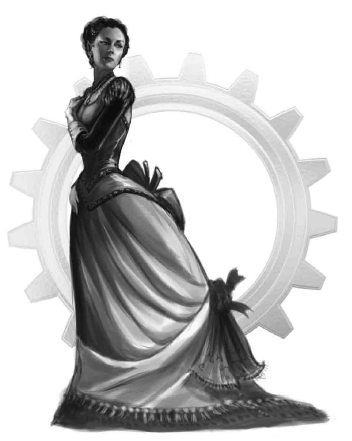 Also all Eldren are mentally ill and will succumb to madness as they get older due to their connection to the aether. Eldren characters get "Artistic Eccentricity" which is a polite way of saying insanity. They have to start play with a choice of Mental Complication that doesn't count towards their total limit and doesn't confer any points. They also get "Planar Empathy" which gives them one Clairvoyant or Spiritualist ability for free. You still have to sink points into the ability's skill and if you want to use any other part of the talent's abilities you have to buy them. Alternately, you can choose to forsake Planar Empathy, be part of the unpowered Eldren minority and count it as a complication and will grant you five points. Your Entropy will also drop to Entropy 1. As much as I like that idea (hell it fits thematically if you want to play a Byronic, long-living, beautiful person who will descend into madness), it doesn't really work that well when you think about it. "I'm gonna pick a subspecies with attribute adjustment and no bonuses besides a point refund! Hooray!" Actually when you think about it...shouldn't you also lose Artistic Eccentricity if you forsake Planar Empathy if your madness is tied to your magic? Also an upper class Eldren starts play with -2 to Fortitude, your health stat. If you give up your magic and play an upper class Eldren, you're just...not as good as a baseline human at anything except you've got extra points to spend and you're better at being charming. Victoriana! GNOMES Gnomes are frail, tiny, nocturnal and are posited to have been mighty sorcerers before the Great Flood did something to take away their ability to use magic. Does this mean you can't play a Gnome spellcaster? It doesn't! Anyway due to their size and intelligence and nocturnal habits, they generally work as clerks, bureaucrats, accountants, anything that lets them use their brains. 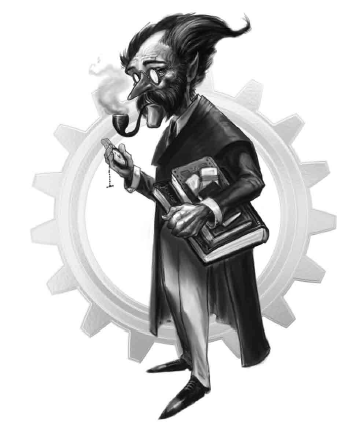 Gnomes get "Night Creature". You add a two black dice penalty to any mental or academic tasks in the morning. However, after midnight you get +1 dice to anything mental or academic, plus you have night vision and reduced difficulty to do things in the dark. They also get "Little Legs" (same as for Dwarves) and "Fragile Physique" which means that you have a hard cap of a +3 to your Strength attribute, period, due to your physiology. I don't really like Gnomes? They're good for being smart and casting magic. That's it. They wouldn't be so limited to me if it wasn't for the fact that they operate on a completely different sleep schedule than the rest of the PCs. HULDUFOLK They're Hobbits. You know exactly what they are, they're just tied up in Norse mythology. They've always existed on the fringe of society but it was Erik the Red who found the biggest colony of them and invited them into society. They're three feet tall and go barefoot when they can because of their thick soles. Having weight on your slight frame is a sign of good fortune to them. They enjoy warm fires, tall drinks and food. They're Hobbits. 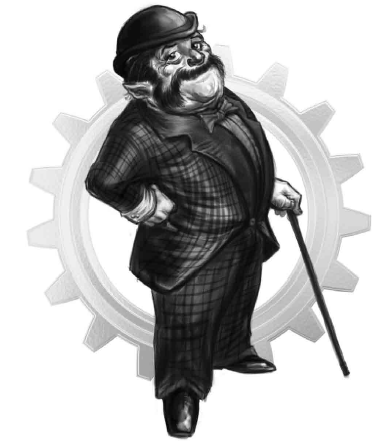 Also they reach sexual maturity at 12 and live to 50 and they're crazy fertile welp. Huldufolk get "Fascination". Every Huldu gets a deep fascination with a reasonably broad that drives them to engage in it, get their hands dirty. So a Huldu with a love of clockwork is going to be wrist-deep in a grandfather clock, not reading a book. They also don't really care so much about social rules when they could do what they like, which is why they're Lower Class. This gives them an advantage to perception rolls about what fascinates them, but also means they have to get two successes on a Wits roll to disengage with their fascination unless someone drags them away. They also get "Sensitive Nose", which gives them acute senses of smell and taste. On the other hand, they get "Little Legs" and "Fragile Physique". Huldufolk would be better if they were the Gnome class, honestly. I mean, they're better than Gnomes and have the same restrictions as them (not counting the diurnal habits), but Fascination isn't good. Fascination would be better if it just helped them with skill rolls relevant to what they love instead of "you're really good at noticing details in Professional Wrestling". Seriously, mash the Gnomes and Huldufolk together, throw away Night Creature and Sensitive Nose, retool Fascination, alter the attribute adjustment and you actually have a useful subspecies that's worth taking. So much wasted potential. HUMANS Humans get no attribute adjustments. They get "Adaptability", which gives them 4 points to assign to attributes instead of 3. They also get "Destiny" which means they start play and each session with 7 fate points, enough to Do A Thing with them. By contrast, all other races start with 4 and cannot Do A Thing. 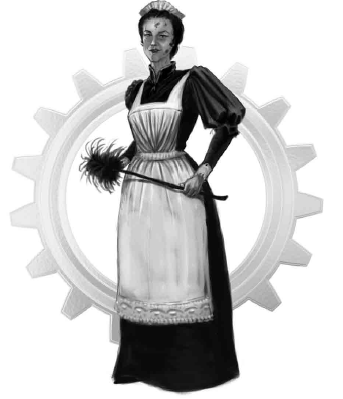 I don't have much more to say. They're D&D/Shadowrun Humans. Just remember to take Beastman Hybrid and pick up some other handy ability for literally no downsides. OGRES Ogres are "what if we did Trolls from Shadowrun but badly?". They're eight feet tall and built like a truck. They're also incredibly gullible, no matter how smart they are. So they're more intelligent 40k Ogryn armed with a steampunk gun. 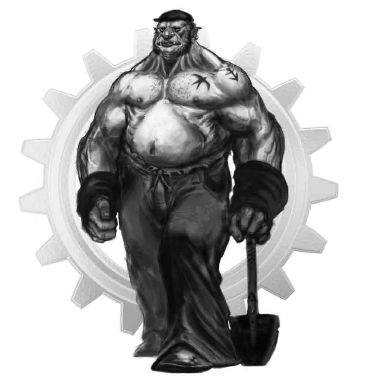 Ogres get "Blunt Wits". What this means is that it's easier for someone to lie to an Ogre using Bull, Charm or a similar skill. Conversely, the Ogre gets a penalty of three black die to attempts to resist the lie (black die remove successes if they get successes). Two people can't manipulate an Ogre at the same time; they have to win an argument/shouting match for the Ogre to listen to them. Ogres also get "Iron Constitution" which means their health is calculated by doubling their fortitude and adding two dice. Instead of "Little Legs" they get "Long Legs", meaning your movement speed is x1.5 the normal calculated rate. The penalty to disbelieving lies is pretty rough; the way their attribute adjustment works is that they're full-throttle fight machines who can be swayed to turn on the party unless someone out-yells the enemy. That is way too much of a liability. I much prefer the Troll approach of Shadowrun. ORCS The majority of Orcs in Britain are immigrants. Even the ones born in the United Kingdom are not born in England proper but in Scotland on the Isle of Orkney (gently caress) and the Hebrides. There's no effort made to integrate Orcs into society and the government just lets them live on the outskirts or in rookeries. Part of this is bald-faced racism (down to them being considered demons) but the other source of the fear is how good Orcs are with machinery and technology. With the age of magic fading and the age of machinery rising to prominence, anthropologists believe that Orcs represent an evolutionary endpoint that will survive and thrive in an age without magic. This is of course speculation; Orcs are capable of magic ability (indicated by silver hair) and they're generally devoutly religious...to the Old Gods who came before the Heavenly Host. The really interesting feature of Orcs is that they have eyes just like Eldren and that fact terrifies the Eldren. 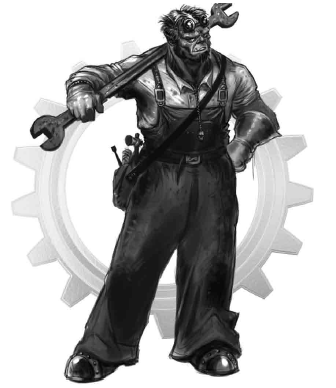 Orcs get "Night Vision" and "Greasy Thumbs" which means they get a bonus die to Ad-Hoc Repair or Engineer/Craft of a certain type of mechanics. They also get the "Foreigner" Complication and it doesn't add to their total complications, they're just generally treated as outsiders to be feared. Orcs are...actually kind of interesting and complex. 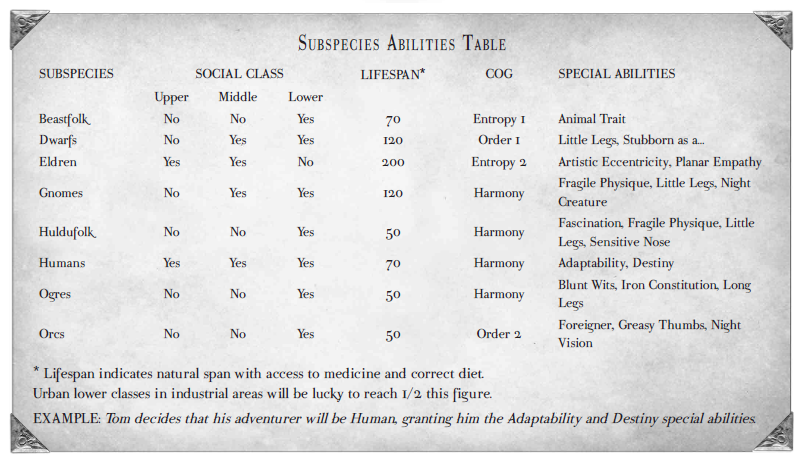 ATTRIBUTES So let's talk Attributes really quick: Strength, Dexterity, Fortitude, Presence, Wits and Resolve. You might know them better as Lift, Combat God, Health, Charisma/Casting Stat, Skill God and Will/Casting Stat/Magic Fuel. If you think I’m joking, you are sorely mistaken. 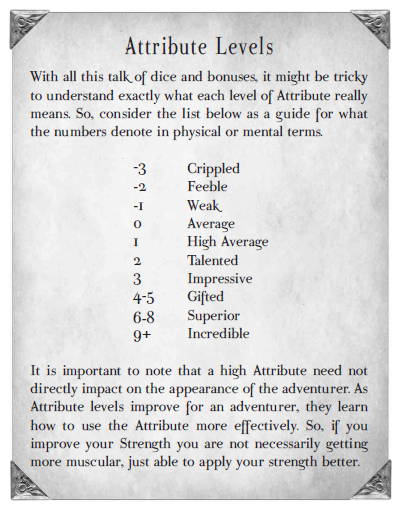 Strength adds to melee damage, general athletic stuff and intimidation. Except it’s not really used for Athletic skill rolls; it’s tied to Dexterity. Dexterity is good for agility and coordination. Dexterity is also the attribute used with every single combat skill to hit and Athletics. And a shitload of other skills. Fortitude is health. Yep. Presence is charisma and how pretty/magnetic you are. If you’re a Spiritualist, you cast off of this. This stat is also good for Clairvoyance and Goeticism. Wits adds a bonus to most of the other skills that Dexterity doesn’t cover. They do avoid a common pitfall in tabletop: having high Wits does not give you more skill points to throw around at character creation. Your Wits generally act as a flat dice bonus to an assload of skills. Resolve controls force of will, resistance and you also cast off it for Necromancy, Thaumaturgy and Conjuring. There are also Derived Attributes. Initiative is Dexterity+Wits+Perception skill, Health is just Fortitude+2, Quintessence is just your Resolve and Movement is this: 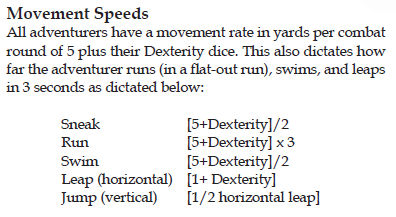 And player Attributes start at 1 and are then adjusted with subspecies templates and the 3 or 4 points you have to assign them. Attributes can only be raised a certain amount at chargen to prevent stacking, +2 points from the adjusted level. 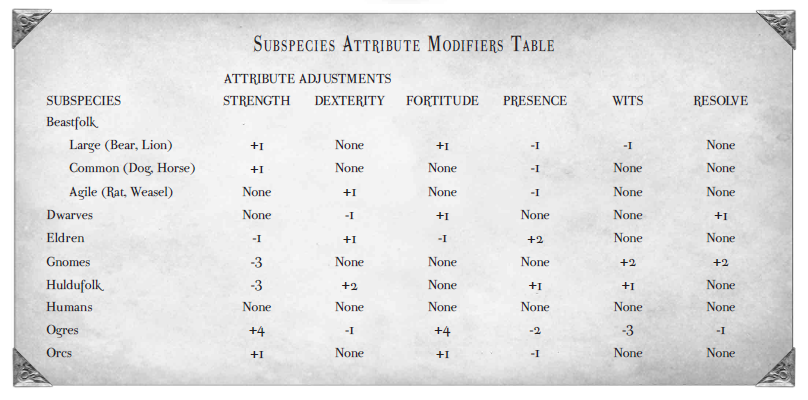 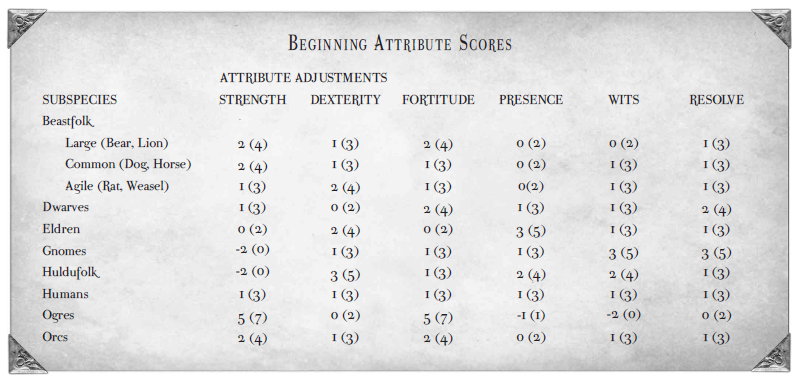 Why am I mentioning the Attributes? Well, two reasons. First, so you can understand what exactly the Attribute adjustments mean. Turns out that Huldu and Gnomes don’t really suffer too much from having lovely Strength! In fact, if you’re going for a combat-oriented character, a Huldu is an excellent idea and you should give them an interest in killing people and a gun because all combat abilities are Dexterity-focused. Actually mathematically they’re not at too much of a disadvantage with their little legs. The one who is really at a disadvantage in combat is a Dwarf because of their Dexterity loss. The other reason I’m bringing this up is because I think the system is actually interesting. You can’t lower one stat to raise another and if you’re a Human you can start with max in two Attributes but it also basically shows a dump stat for every single type of character: Strength. I don’t think I’ve ever seen a game where every single type of race has the exact same dump stat. You don’t need to put points in Strength ever because 1 means you’re just kinda just better than a normal person and it’s all you’re going to need. I mean the game does a pretty good job of giving you a clear level route to take for improving your character and that’s handy. It’s not great, but it’s not handy. So those are the core subspecies. I would not recommend some of them, depending on what you want to play. And some would say it’s kind of a lot of subspecies. I mean, before I went into the sub-subspecies of the Beastfolk, there’s still 8 D&D/LOTR races to choose from. Why not throw even more imbalanced/useless subspecies into the mix and gently caress this all up? 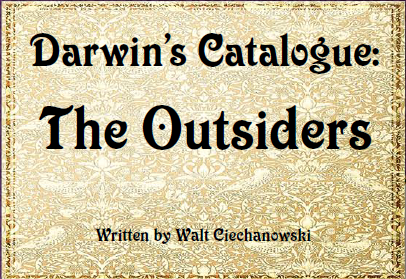 The Outsiders is a 14 page PDF that offers five new races and also Orcs again. Why? Because they’re immigrants I guess. But, uh. Yeah. Orcs again. Rest assured, there is literally nothing new to the Orcs but everything else is new. This book also has rules for a different type of magic, but we’ll cross that bridge later in the core book. This is all about new subspecies. 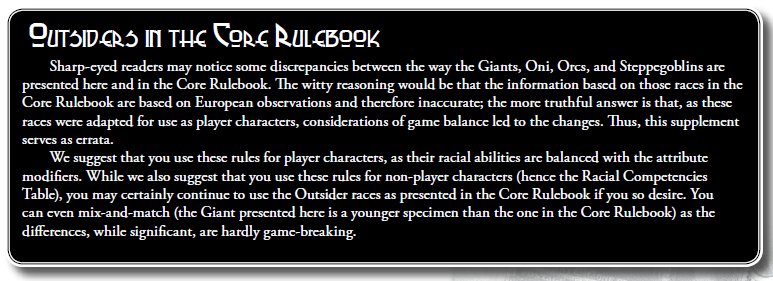 This book might also be 2e but the core is just like “oh yeah no it’s backwards compatible, just…whatever, make it fit” in regards to 2e products. GIANTS First of all, Giants are 20 feet tall. They are also clumsy and kind of stupid and believe heavily in the mission of the Aluminat. Giants originally lived in the mountains and foothills after a bunch of Bronze Age wars chased them out of the flatlands. Then businesses and armies needed shitkickers/stuff-pushers to work for them and now Giants live in society again. 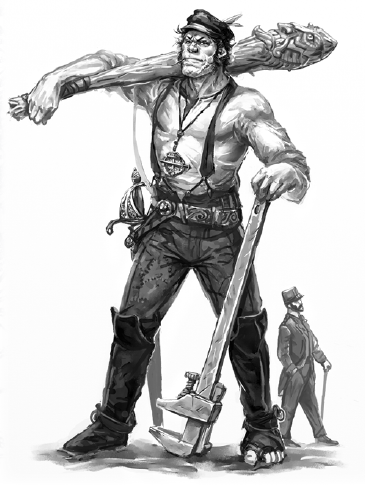 Giants get “Huge”, which gives them +9 dice in melee damage and +6 health dice at the cost of a -3 to Hide & Sneak and +3 for people to hit you. They also get “Iron Will” which is +2 to resisting magic. Their main downside is “Clumsy” which means some people won’t let you go in certain places and you have higher difficulty thresholds to Dexterity skill checks. 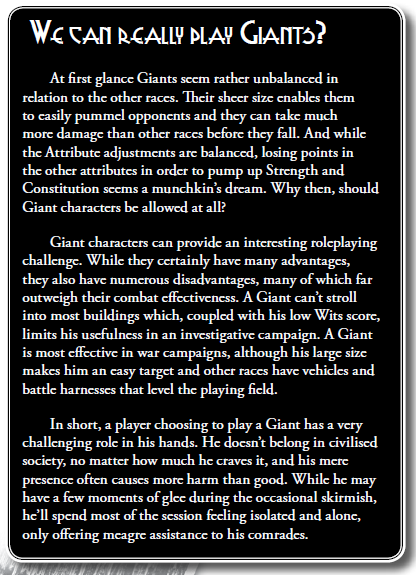 So Giants are 20 feet tall and useless in this age of guns. They’re considered mentally crippled when it comes to their Wits and Presence. Yeah they’re big and strong and yeah they hit hard but remember: Dexterity rules the combat skills. They have a penalty to combat skills and a penalty to Dexterity. In fact, they start with -1 Dexterity without points put into it which means they have to roll a black dice for every combat skill and if that black dice is a success, it eats a success on a regular dice. They’re just so bad at fighting! They just havenothing going for them. KARAKON The Karaka are from Central Asia/Eurasia. They're roughly the size of Gnomes but with large ears, oddly long limbs and skin that is both hairless and lightly leathery. The Karaka used to be a more prominent subspecies in ancient times, providing a strong backbone of magical talent. Unfortunately they were slaughtered by the Roman Empire and driven from their homelands in the Eastern Mediterranean to the East. They kind of embody the Inscrutable Oriental stereotype in that they're only loyal to their family, they're traders and they have a highly developed set of social rituals to convey info without speaking. England itself doesn't really like them due to the fact that they're more shrewd merchants than they'd like and Karaka may have been responsible for a King's seizure of the crown, who then banished them out of fear of them. The banishment took place in the 12th century and wasn't lifted until the 17th. They're in no hurry to return to England. 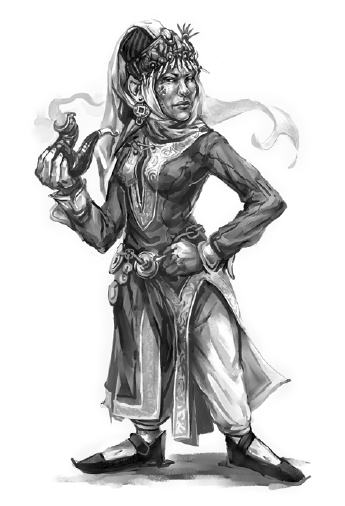 For downsides, a Karakon character gets "Little Legs" and "Fragile Physique". For upsides they get "Night Vision" and "Mana in the Veins" which I literally cannot find in the core book for 3 and a cursory Google search indicates that it reduces the final cost of casting a spell. I have no idea if this is just a 2e thing but I seriously can't find it in any of the books. So that last little curveball aside, this is actually a somewhat enjoyable take on the small magician character. They start off with decent stats for spell-slinging and have a good talent for doing that. They're a pretty good choice for magic users. My main regret is I have no idea how the plurality of their name works. ONI What's interesting about Oni is that they're not native to Japan. It turns out Oni have also been found on the Pacific Coast of America by Lewis and Clark which gave rise to the whole Siberian land bridge theory. Or maybe they just had their own sort of Atlantis connecting Japan/The Pacific Rim with the west coast. Who knows? The other topic of debate is how closely related are they to Ogres. They're basically smarter Ogres but slightly less durable, skilled melee warriors with none of the mental drawbacks. If Oni were more widespread than Ogres, things might be quite different. 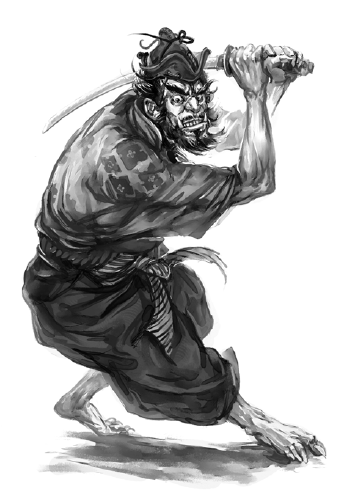 Oni don't get any negative traits. In exchange they have rougher Attribute adjustment. Oni get "Long Legs" and they also get "Stout Constitution" which is (1.5xFortitude)+2 as opposed to the Ogre's 2xFort+2. I mean, really, they're just smarter Ogres with none of the social downsides save for the ding to Presence. They would be a good alternative to the Ogre if they both weren't pretty hard to recommend due to Dexterity Supremacy. ORCS Still Orcs. All the stuff is seriously reprinted verbatim. 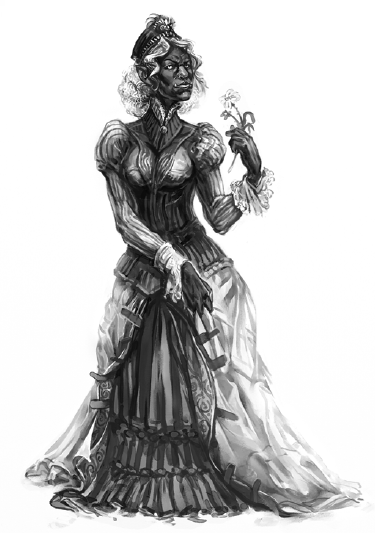 STEPPEGOBLINS The genetic heritage of the Steppegoblin and the Eldren is a point of interest among natural philosophers. Steppegoblins are Central Asian/Eurasian that make up 20% of the aristocratic classes of Russia. They're known for their natural magic prowess and the only physical differences between a Steppegoblin and an Eldren is that Steppegoblins are shorter than them and tend to have silver hair, but the height aspect isn't enough that you could really tell them apart. This actually comes in handy when it comes to matters of espionage and treachery. The real difference between them is their magical ability and their minds. 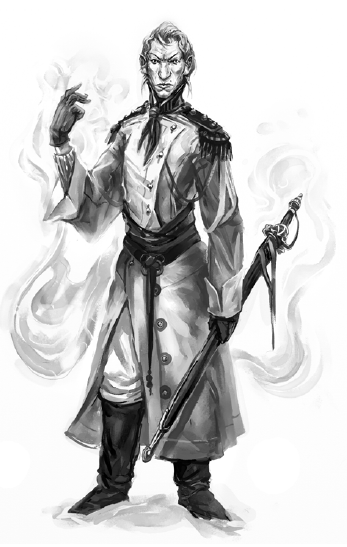 Steppegoblins also get "Planar Empathy" but it only applies to Mediumship and it only applies to Corporeal Mediumship (translation: Shadowrun Physical Adepts). They get one Corporeal skill for free or can forsake this for refund points. Their big mental drawback isn't insanity but temper, giving them the Rage complication automatically for no points. Y'know I won't lie, I like the Steppegoblins and not just because Steppegoblin is a pretty cool name. They don't get Strength bonuses, which is fine, but they get baseline Dexterity and a little more Fortitude. They also get to do some pretty fun combat stuff with Corporeal Mediumship so it's pretty good to get free access to that, especially if you go the gun route, because some of those skills affect your Dexterity pool. In the distance past of 1856, one of the most dangerous forces to be reckoned with is a pissed-off Russian elf with a gun. 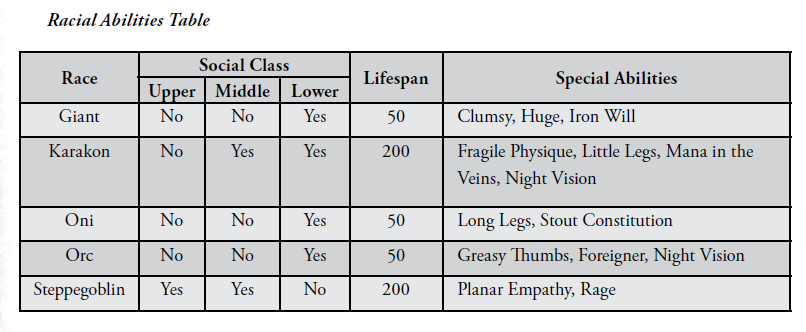 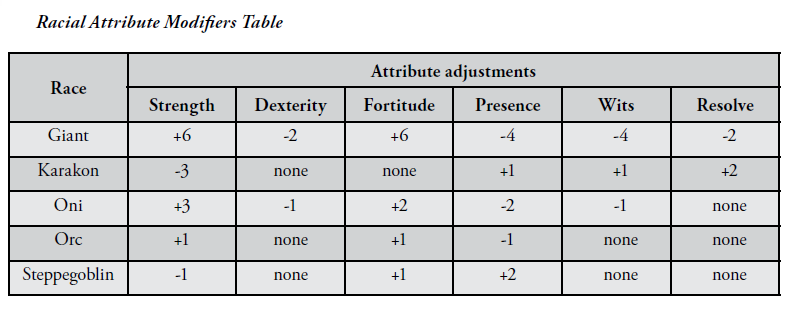 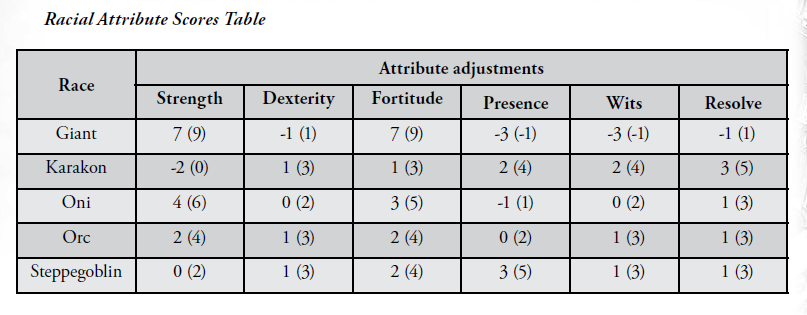 Also technically everyone I mentioned above is never truly accepted by society. But we're not done yet! HOW ABOUT ROBOTS?  Marvels of Science and Steampunk is a longer sourcebook for Victoriana that tackles more steam inventions and cutting edge science. It also includes rules for new races, and this book has Orcs as well. Yes really. 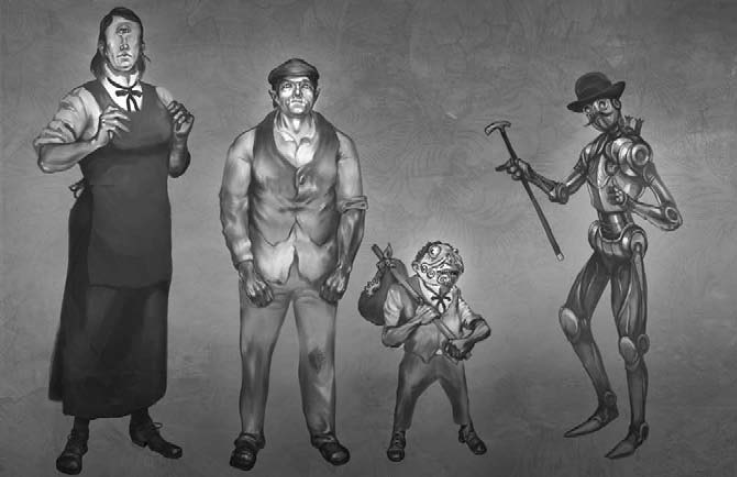 CYCLOPS Cyclopses(si?) were discovered in South America in the nation of Patagonia. They were known to exist but the few tribes of the Mediterranean had died out thanks to the Romans by the time the Spanish found South America. Magellan was the one to make first contact and learned the story of their lost island nation of Patag and how they fled to build a technologically advanced civilization on the coast. Magellan did listen to their wish to be left alone to a pastoral existence and he left, but the encroachment of other European powers interrupted their isolation. Naturally brilliant, some of the Cyclopses left their homeland to see the technology of the world and bring it back to reverse-engineer it. They're a largely neutral country and have bought their neutrality by sharing their inventions with the world. Cyclopses are not a violent subspecies, most of them content to read and tinker and talk. The outside world enjoys their company. For downsides, they get "Distinctive Feature" for their single eye and "Poor Depth Perception" which counts as the Missing Eye Complication. On the other hand, they get "Inventor" which is +2 skill points to a technical skill of choice and "Long Legs". Their Attribute adjustment is also pretty gentle. They make a good inventor character choice and that's really all there is to say about them. They're not really the focus of this whole section. That would be... MECHANICAL MEN Sentient machines are a rarity because they require care and planning to build. They're also not truly sentient. The mind behind a Mechanical Man is a bound spirit, elemental or demon in a metal shell. A lot of them destroyed themselves to escape but the longer one remains in a metal body the more they forget their old lives. People are generally afraid of them because they can't tell them apart from regular non-sapient automatons and there's a general atmosphere of fear among common folk and the Guild. They're all custom made and they're all either powered by clockwork and a little magic or steam. All Mechanical Men get the following Traits before you pick a chassis. They're "Loud" which gives a penalty to stealth, "Mechanical" which means they can only be healed from repair but have immunity to diseases and such along with "Engine" which means it takes 5 mana out of their pool daily to operate their head and limbs in addition to having a wind-up key or coal boiler. They also get "Clockwork Augmentations" which means they can wear clockwork augmentations, "Custom Design" which means they can swap around body parts with luck on certain rolls and "Mere Flesh Wounds" which reduces damage taken and can be purchased multiple times. Then you pick a chassis. Burrowers are the size of Dwarves and Gnomes and were built to tunnel. They get "Little Legs" but they also get "Burrowing" which adds +2 dice to Athletics rolls in small spaces. Entertainers are the size of humans and were built to entertain. They get "Fragile Physique" but they also get "Enthrall" which lets them use their Dexterity in lieu of their bad Presence for Charming people. They also get the Talent "Work of Art" which is a non-existent Talent and was supposed to cover up their prosthetics but became Enthrall and wasn't errata'd out. Laborers are the size of Ogres and were built to haul poo poo. They get "Long Legs" and they also get "Ham-Fisted" which adds +2 damage dice to melee at the cost of making you naturally destructive around small or fragile things. Servants were designed to keep house. They get the "Eidetic Memory" Talent which means you can make an easy Wits roll to remember things specifically along with "Silver Tongue" which adds +2 dice to anything involving Speech. You also get the "Proper Sensibilities" complication which makes you anal about society. Basically you're Threepio. HOOOOBOY. Entertainers are awesomely broken. Yeah they get Strength as a bad stat but they get Dexterity as a good stat and they also get the ability to use Dexterity to be smooth and social. That is hilariously broken. I can't say much about Burrowers, Servants or Laborers; they're just not as good as the Entertainer's ability to cheese things and they really don't bring anything fun to the table that takes advantage of them being machines. Just give the singing robot a gun and make sure he's your friend. NAACAL The Naacal are from the Pacific and are an amphibious race that can be found around the Pacific Rim, Polynesia, Indonesia and Madagascar. They salvage everything they come across, making their seafaring homes out of garbage and other repurposed trash. They don't have to live on the ocean, but they're comfortable by the sea or on the coast. They also have a reputation for being kleptomaniacs due to their habits of taking things they think people have thrown away or won't need. Naacal get "Little Legs" and "Fragile Physique" as downsides. For upsides they get "Aquatic Aptitude", "Peripheral Vision" (just like sheep they have weird eyes) and "Swim Like A Fish" which modifies their swim speed. There's no actual bonus to using their Wits outside of attribute adjustment. They're...okay? They're basically Better Gnomes but with more of a seafaring bent. They're really not much to write home about. ORCS Still still Orcs. 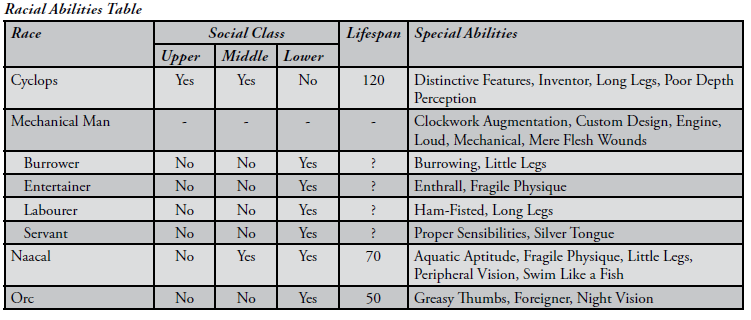 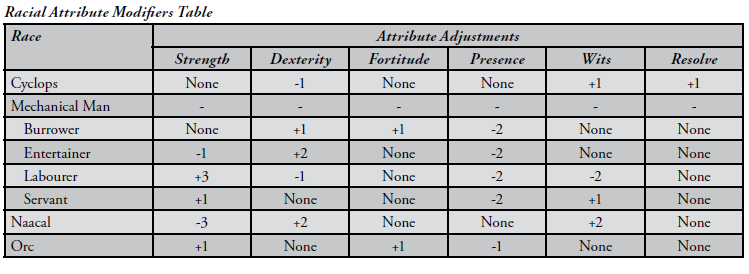 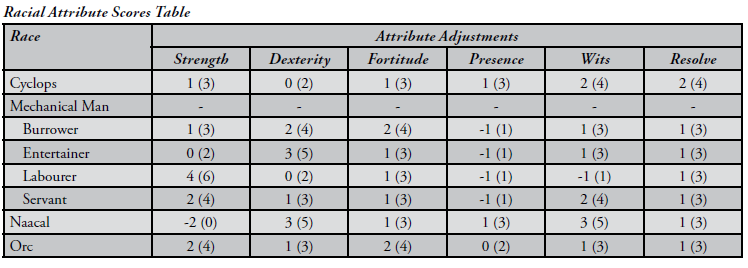 Thoughts: I think the best team across all three of these books would be an adventure crew consisting of a Human sharpshooter, a PhysAd Steppegoblin armed with inaccurate spray-and-pray weapons, a dashing Mechanical Man Entertainer with matching revolvers and a Karakon mage doing what needs to be done when it comes to magic. And that's mostly because I'm thinking of things by Shadowrun metrics because this game keeps trying to sell itself as Victorian Shadowrun but noooo it's not. It still isn't. NEXT TIME: good golly Miss Molly I hope you like a shitload of skills and things to buy in character creation. At least we're done dipping into other books in the line.
|
|
|
hyphz posted:I think the only other thing that came out for Continuum was Further Information, which is mostly known for its bizarre attempt at a metaplot twist (something like "actually, time travel is many worlds based, but because of the effect on morality our particular time travel implants force you to be always tied to our one timeline and Frag is what happens when you try and leave") Kurieg posted:So basically the Inheritors like the fact that they're the big kids on the block and intentionally ensure that all other forms of time travel are limited to the timeline that allows them to be brought into power.
|
|
|
|
|
Ugh. Dwarves are all rich because they work hard? Fuckin' Horatio Alger poo poo, poor people in Victorian England worked themselves to the goddamn bone.
|
|
|
|
Zereth posted:Sooo, the narcissists are, in fact, correct. Basically all of their claims are accurate. I did not really expect that. Thing is, they're right but the Continuum are right too - without a massive amount of support time travel is ridiculously dangerous, and you can't have a massive amount of support if there's no shared objective. You think you're going to rule your own personal time stream but in fact you end up wiping out humanity by bringing the wrong microbe to the past with you. Plus, since the Inheritors invented the time machines, any timeline without them is going to be paradoxical by definition. hyphz fucked around with this message at 15:06 on Oct 20, 2016 |
|
|
|
It's time for more Irish Wolves! Ironclaw! When we left them, the Phelan had split into three clans and begun to spread out further. When they went east, however, they ran into the boars of Doloreaux. While they'd won their war with the Morrignai on having anything approaching organization and tactics, the spearmen and skirmishers of the Phelan didn't fare nearly as well when the fourth, newly created clan, the Oirthir, encountered a more settled foe that also used some measure of discipline. The boars and wolves almost instantly came into conflict, with the boars desiring to expand west while the wolves wanted to continue filling in the east; the wolves assumed the boars to be another species of monster and the boars assumed the wolves were crazed savages attacking from the dark wood. The Queen of the Oirthir ordered Doloreaux captives to be taken to her for questioning, and soon discovered these strange foreigners were people, not monsters like the Morrignai. She also quickly discovered her lone, young clan was losing; the settled boars had superior weapons and armor, and knew how to fight in a line. Outside of defensive actions in the forests, the Oirthir couldn't hope to match them alone. She sent messengers to beg the Deasaich clan for help, and they refused, until the severed head of Finias weighed in on the matter by magic and demanded they aid their kin. This marked the first time the Phelan clans had united against a common enemy since the civil war over succession in the days of the Reeoil. It wasn't enough. Even with two clans, the Doloreaux's superior weapons and tactics crushed the disorganized Phelan and drove them from the fertile canyon that had formed the heart of the Oirthir expansion. Briana, the Queen of Oirthir, was forced to ask the original Reeoil for help, paying tribute and fealty to the King in return for being recognized (through some linguistic and legalistic trickery) as officially Queen of the Oirthir, and not merely their chief. This united all three clans against the Doloreaux, and while the Phelan version of the story speaks of a great victory over the years of fighting, they never got that canyon back; the Doloreaux simply stopped their westward expansion and dug in, content to hide behind their fortifications and holding the intersection of rivers they'd initially attacked to capture. It's pretty clear the Phelan managed to fight to enough of a standstill to prevent the Oirthir being rolled over entirely, but lost the war. The Phelan continued their expansion throughout the west, conquering minor houses and tribes and pushing to the southern coasts, into what would today be Bisclavret country. As they did, it became clear they were covering too much ground to govern from four individual thrones, at least in the Phelan sense of government. Far-flung villages were left entirely to their own defense in the south, and quickly felt more kinship with their local chiefs than some distant king or queen. Several honored Brehona, lawyers and judges, were given the task of naming a fifth King and a fifth clan; this sparked intense maneuvering among the ambitious chieftans of the Phelan, all of whom wanted to be the next great clan leader. Duels were fought, and Phelan records claim 3 times 50 noble men and women died in the fighting in a single year (This is recognized as a Phelan saying for 'Lots' and not an exact number). Eventually, the Brehona came to their decision: Not one, but two new clans would need to be created, to rule the furthest north and the furthest south domains of the Phelan. Their decision may've had as much to do with politics as with geography; there were two very strong contestants for the kingship and had they not named two titles, it is likely the loser would have declared war on the winner. Instead of a civil war between powerful nobles, they instead had the Tautha na Cell in the north and the Tautha na Bianfels in the south (who would become the Bisclavret, if you recall). And then disaster struck, 3x50 years later, when the Bianfels signed the Charte du Bisclavret and broke with the old ways entire. The Brehona were overthrown as guardians of law, the Druids cast out as guardians of the spirit, and the Bianfels were lost to the Phelan. The Phelan made an attempt to reconquer them, as ambitious young warlords thought to take Riddock's crown, but there was an unfortunate truth waiting for them: Phelan magic and skill in the woods can do nothing against a castle with cannon. Much like their encounter with the Doloreaux years ago, the Phelan simply couldn't overcome an organized enemy with superior weapons, armor, and fortifications. The Phelan were defeated, and the Bisclavret lost to the old ways. Nowadays, the Phelan wait in the woods, continuing to follow their old ways and guarding their borders. They've recently begun talking to the Avoirdupois, despite the fact that the two hate one another, because they hate the Bisclavret quite a bit more. It's uncertain if anything will come of this; the Avoirdupois normally don't care for pagans and the haughty horses annoy the proud wolves. They continue to despise the Doloreaux and the Bisclavret; they consider the Bisclavret a mad and broken people who have forsaken all civilization. But Phelan commonly leave the forests on a more individual basis, as druids, atavists, and adventurers go to other lands to seek adventure and explore. Rinaldi are quite fond of employing Phelan, for the novelty of their strange powers and stranger magic, and there is no real animosity between the two. Next Time: The Culture of the Phelan.
|
|
|
|
Night10194 posted:Someday, I'd like a world like World of Darkness where there IS no masquerade. We know these things are out there, they know we're out there, and now society must contain both. This is just begging for a buddy cop story about an old gruff veteran who has seen everything, and a Beast necwomer who doesn't play by the rules. "Why did you put a plastic bag over his head after handcuffing him?!" " *shrugs* It was a nice touch"
|
|
|
|
 Chapter 7: Storytelling Let's get the two story examples out of the way. quote:Inheritance So let's just map out Ben's plot arc here, a teenager is told that he will be allowed access to a wider, darker world. He finds it amazing and horrifying but then is press-ganged into a family and forced to associate with a Vampire. After he befriends and falls in love with said vampire his "family" berates him for becoming too close. He's then attacked by a Hero and only the Vampires are there to save him, and he retreats into himself and becomes a terrifying sea-beast at the tender age of eighteen. Yup Beasts are totally the good guys and their culture is completely functional. quote:Tales of the Dark Mother: Hin Oh man if only the mages had listened to the wise oriental they wouldn't have died horribly. I thought you were better than this Matt.  I... is that a young Haley Joel Osment? Anyways, the chapter opens with some common threads for the Storyteller system. Engage your players, get aspirations, have them suggest plot points, don't be afraid of spoilers. Be consistent with plot elements (Don't let someone survive a fall off a roof unless you're prepared to let your PCs do the same). Build the world around player backgrounds (If you've got a teacher you need a school. If you've got a Makara you probably need a body of water.) And more than any other game be sure to include a supernatural culture in your planning. Advanced Storytelling Techniques Let's get into the new meat of the chapter. Eschew Common Structures quote:In Western film, books, and other media, particularly genre fiction like Chronicles of Darkness and Beast: The Primordial draw inspiration from, you find certain trends and tropes. The “monomyth,” popularized by Joseph Campbell’s “The Hero With A Thousand Faces” is one of the most common structures in modern fiction. It largely entered the pop culture parlance through George Lucas’s Star Wars. However, it doesn’t really work for Beast. You can make it work, but that structure is not Beast’s default state. quote:Instead, look to stories about outsiders, about disenfranchised people, and about communities that exist on the outskirts of the mainstream. Beasts aren’t the heroes, but the Heroes aren’t really the heroes, either. Nobody needs to be the hero of these stories. These are stories about people (albeit monstrous people) and the unique challenges they face. They’re not only stories about overcoming adversity, but about how people react to dramatically strange circumstances. Consider Grendel, an archetypal Beast story. Grendel isn’t a story about whether or not Grendel can conquer his foes and overcome obstacles; it’s a story about Grendel coming to realize what he is and coming to terms with that. We don’t care if he can win in a fight against a given opponent, we simply care about what the fights mean. But.. Beasts aren't disenfranchised. By definition they're the most enfranchised of any supernatural creature just by their bloodline ties. And Grendel doesn't condemn or villify Beowulf, he's a leader protecting his people. Also, Grendel still dies in the end. The only condemnation the book makes is of the person who writes the story that vilifies Grendel for killing people. Four-Act Style quote:Consider looking at other models. One good example of an alternate story frame is the Japanese Kishotenketsu, which is popular in some Japanese animation, and has been co-opted in some western television shows when they film a “Rashomon-style” episode. It’s a four-act structure that works in a relatively tight pattern of introduction, development, twist, wrap-up. For Western audiences, many of the renowned films of Akira Kurosawa have popularized the idea (even if it’s not something formally recognized and widely discussed). Stories such as Rashomon embody the idea of a “conflict-free story”. This isn’t to say the story has no conflict, but the story isn’t about the conflict, it’s about understanding the path and the intricacies in interweaving tales. Look, Rashoman is a good movie, and Multiple Viewpoint stories are good when they're well done. But they are very difficult to pull off and I think asking that of a Storyteller, even one of intermediate to advanced skill, is a bit much. Particularly as it's described here in the game quote:This model assumes a single game session covers the four acts of the story. However, if you are planning ahead for a larger chronicle, each act could be a full game session, and you can play it in a more relaxed, soft-handed fashion. But a four-act story requires some attention to pacing, to keep things moving ahead. All games require mind to pacing, but in a more traditional game, break points are more obvious. As the characters uncover and resolve challenges, the story moves forward. Conflict drives the plot. With a Kishōtenketsu style story, it’s important to move forward as soon as possible, and to not let threads linger too long. Listless characters, and by extension listless players, will tend to seek out conflict resolution if they feel there’s no direction. Act One: Introduction Is where you introduce your characters and story elements. The game suggests using this session to build characters as well. If you need to paint then it's a good thing you have dots in crafts. Oh look a locked door good thing bob is suddenly adept at lockpicking. Which seems interesting but also places a greater import on the story itself and forces the player characters to fit. Also: quote:In Beast specifically, this should be where you showcase some of what makes the characters truly monsters. Give spotlight to Nightmares and Atavisms. Give longer, more elaborate descriptions than you might otherwise. Focus heavily on the direct and indirect ramifications of these monstrous features. Don’t be afraid to give a quick cutaway, just a brief description of some of the ripples happening off-camera. If a Nightmare breaks a person’s will, show them at their family dinner table that Sunday. Show the family asking him what’s wrong, and gossiping about him when he goes to the restroom. Show us his fiancé, cupping an engagement ring, and opting to second guess himself and put it away when his lover’s behavior becomes erratic and disjointed. Show us his custody hearing where his defensive attitude costs him visitation rights with his children. This should happen quickly, but clearly. Act Two: Development is where you add plot. Not resolve it, in fact the game states rather insistently that you should not resolve any plot points in this section. quote:It’s important you don’t allow for any superlative resolutions at this point; your goal is to add plot, not let it go away. The players need to be made aware of this in order to keep with the structure. Normally, players will work toward resolution as rapidly as possible. With this style of play, they have to understand that they can’t get that until a certain amount of time has passed.  Just wait until the fourth act! Don't resolve anything! Because Act Three is going to be even more confusing. Act Three: Twist Take away your players character sheets, you aren't playing Beast tonight, you're doing something completely different. And it's not related in any way until the fourth act. quote:If your players are amenable to suggestion, you don’t need to explain what you’re doing. Just tell them you want to try something different tonight, and run with it. Let Act Four tie these threads together. If you go this route, it’s important to keep things as Act Four: Wrap-Up THEY DON'T. Surprise. The players do. quote:Lastly, we bring it all together. Here, we discover how the divergent stories are actually one story. Every element on the table is eligible for “resolution,” which means a player can take it and, within the scope of their character’s story, explain how they are related. Doing this grants a Beat. Cross out the element, or otherwise note that it’s handled, and it’s married to the story entirely. This can be done once per player per scene. During Act Four, the players can’t add new elements for failed rolls. Crossover This section is fairly short and can be boiled down to a few important points. Focus on one or two strong themes: if you've got a Vampire, Changeling, and Beasts in a group together than focusing on Feeding and the descent into inhumanity is probably best. let players excel in their areas of expertise and be careful about stepping on each others toes: the Vampire player might be miffed if the Werewolf player takes all the social gifts and starts out-maneuvering them, players should state goals and where they want to take their characters and work with each other. Avoid conflicting social groups: a Changeling will find little of interest in the Vampire's dealings with Ordo Dracul. Heroes The chapter continues with a discussion on Heroes. quote:Heroes can be difficult to use effectively because we tend to think of them as, well, heroes. They are called “Heroes” for a reason, though (they could just as easily have been called “Slayers,” which would have conveyed a different message): Beast is about the monster/monster killer narrative, but it’s meant to subvert it. Beasts aren’t necessarily good people; they can be, but it’s not a prerequisite for being the protagonist. Heroes aren’t necessarily good people, either. quote:The reasonable, caring, “good” Heroes don’t make much of an appearance in Beast, not because they don’t exist, but because the narrative role for the Hero in Beast is that of a violent, narcissistic antagonist. If you want to include Heroes that break with this narrative role, go ahead! The prevailing thought among Beasts is that Heroes are dangerous and violent, because that’s the type of Hero they tend to find. Again, thematically speaking, breaking narrative assumptions and recognizing that easy labels aren’t so useful is very much in keeping with Beast (this is also why Melanie is included as an example Hero; she’s not violent and narcissistic. The way that a brood deals with her would be very different than dealing with, say, Desmond. Arguments quote:Look at the fervor with which people will argue about what is important to them, from comic book movies, to gender, to space cowboys, to vaccines, whatever. Even if the person doesn’t have a leg to stand on logically, they hold their perspective. If you listen to their reasons, it at least makes sense why they believe what they do, regardless of whether or not they reasonably should. It’s about identity. If you identify with something, an opposing viewpoint isn’t attacking your argument, you feel like it’s attacking you. This is, perhaps, more noticeable on the Internet, because people online don’t see the other people they are talking to, so it’s much easier to depersonalize. People are wired to believe what they hear or see first, though, and they also tend to sympathize with whatever argument gives them a narrative that they can agree with. Conspiracy Theories Heroes form conspiracy theories to justify their hate, we're talking huge thread walls with postit notes and newspaper clippings. Apparently. Which is rather... strange considering their previous characterization. "A simple, single belief is easy to discredit. If the Hero is wrong about that one single-minded topic, he can be shut down wholly in an instant and the entire fabric of his identity falls apart instantly. That leads to violent rages and Heroes who would give up their cause." but.. no? quote:The more complex aspect of conspiracy theory requires the theorist to be at the center of the theory. For most theorists, it’s one thing to say NASA never landed on the Moon. But it takes a whole different level of theorist to speak with any sort of “authority.” That theorist is your Hero. He stands at the center of his grand theory. After all, he was slighted. Remember, the conspiracy is a challenge to the Hero’s identity. The Hero must never consider himself culpable for any of the various strings on this web. No matter what he does, he has to be able to rationalize, justify, or ignore the influence of his actions. This means he needs an excuse for why everything goes bad around him. Why do Heroes need a conspiracy theory? They're literally incapable of introspection and have the walls of reality screaming at them that Beasts are Evil every time a Beast so much as takes a poo poo nearby. The Sidelines Heroes have enablers that make excuses for him! Clearly he's not evil because he didn't kill that vampire over there! The game's back in full on Hero demonizing mode. Heroes and Integrity quote:As explained in Chapter Four, Integrity is a game trait measuring the health of a person’s soul and self-image. Integrity does not, by itself, measure whether a person is “good” or not. It is not a measure of kindness or compassion. Certainly people with high Integrity traits tend to be strong of character, and strength of character leads to empathy and compassion, but it is possible to have a high Integrity rating and be harsh, cruel, or even violent. It simply means that the character is well aware of who and what he is. quote:As noted in Chapter Four, it’s possible to lose Integrity from exposure to the supernatural, but this by itself doesn’t usually reduce the trait low enough to qualify a person for becoming a Hero. Thematically, too, it’s not appropriate for someone whose only “crime” was bearing witness to the supernatural to become a violent narcissist; if such a character is going to go out and seek out the supernatural, it should probably be in a different context than strapping on a sword and a gun. Since Heroes are Storyteller-controlled character, you as Storyteller dictate why the Hero is the way he is, so make choices that allow the Hero to fulfill the appropriate role in the story. If the Hero is a sympathetic character, driven to hunt monsters by the relentless attacks of the supernatural, then you might be better served checking out Hunter: The Vigil (and perhaps using Beasts as antagonists). If, however, the Hero has deliberately shunned other people, defining himself by what he is not, what he hates, or the wrongs done to him, that’s a perfect candidate. The line is thin, and that’s deliberate. Resolving a Heroes Threat Kill them. Oh no wait they want to provide other options than killing them because Beasts are supposed to completely reject the idea of a narrative.
Getting them Together: A Web Have you player characters ask each other questions about how they know each other. I just summed up two pages. Lairs Make lairs spooky, anthropomorphize them, make them seem like living breathing things so that your players will understand that they can die. There's also this paragraph in a discussion on adding chambers. quote:It is also possible for a Beast to build a Chamber based on Integrity loss that she had nothing to do with. As described in Chapter Three, if a character loses Integrity due to witnessing the supernatural, it creates a Chamber in the local hive that the Beast can add to her Lair, provided she can learn the context in which it occurred. gently caress this game.  So what's different? Heroes. quote:Heroes Exist Even When Off-Camera quote:The Blame Game There's also this sidebar in the section on how to get player characters to work together quote:Kissing Cousins So that's it, almost. There's still one more bit of the book to cover. The sample adventure. Spoiler Alert: It's not good. Up Next: We put this wounded beast down.
|
|
|
|
Wow that is such a bad misrepresentation of the monomyth. The beast/dragon may as well be a basic obstacle, and the idea of the monomyth is the mundane ascending into the beyond and their eventual return to share their gifts with the common man, with obstacles riddling their path. The stories of the Gautama Buddha and most bodhisatvas follow a monomythical narrative. And those are rife with pacifism. Im not at all familiar with Kurasawa's works (barring his magnificient cinematography, hoo boy its good) but I wouldnt be surprised if they misrepresented that too.
|
|
|
|
Kurieg posted:
Weird how they picked Rashomon of all things as an example for the four arc structure. That's not really an easy movie to emulate on the tabletop. Unless the PCs are lawyers/cops. And would an opening fiction about a Beast getting hunted down by magical girl expies of all the good WoD splats be too on the nose?
|
|
|
|
"See in this game you're the bad guy and the good guy is hunting you, but it turns out the bad guy is actually *good* and the good guy is *bad*. Did I just BLOW your MIND?!?" What a pretentious idiot.
|
|
|
|
Doresh posted:Weird how they picked Rashomon of all things as an example for the four arc structure. That's not really an easy movie to emulate on the tabletop. Unless the PCs are lawyers/cops. Yes. Whatever you do with the WoD, it's best to just ignore Beast and pretend it never happened, because it doesn't add anything anywhere and there's nothing worth getting out of the concepts in it.
|
|
|
|
Oh boy. Ohhhh boy. Narrative structure! I can talk about that! There's something required to most every story, whether you're writing a Hero's Journey or a Monomyth or whatever else: The protagonist has to do things. They want something, something (whether a person or their own insecurity) is in the way, they must overcome that to get it. It can be mostly navel-gazing. But they nearly always have to be proactive. What that text tells me is that Beasts aren't supposed to be proactive. They just sit around while the Hero acts, eventually bumbling into them one day for no real reason on the Beast's part, and then the Hero fails (because that's what the game makes them do) and nothing is learned because that explicitly goes against the game's " "themes" ". (How? "Because.") The story they're writing isn't a subversion. It's a non-story. Beasts are non-protagonists. No wonder there's no clear way to make a hook for a Beast game - the Heroes are the only ones doing anything. With this, I have a better idea of where this game came from. They wanted to turn the narrative on its head, but they didn't understand or bother to figure out why the narrative (any narrative) is structured the way it is. Thus, they couldn't replace the roles in any way that made sense, or went any deeper than the most basic "the good guys are bad and the bad guys are...also bad, but the good guys are worse for Reasons! Aren't we clever?" This sentence was particularly telling: "Part of the compelling aspect of Heroes is that the Beast doesn’t usually have a direct tie to her assailant." ...So what's the compelling aspect of Beasts? The second quote from that doesn't even make sense with what they put together and shows further complete misunderstanding of the narrative they're trying to twist. I would also argue that trying to play a game in a conflict-free story method is just asking for failure from the start. That doesn't work for an RP. I also don't think that trying to force a specific pacing (especially by interrupting to play a different game completely, what?) will work for RP. I can see a lot of opportunity for players to get sick of delays and quit out of boredom, if any ST actually lacked enough sense to try and stick with this. This loving game. 
|
|
|
|
Night10194 posted:Yes. Whatever you do with the WoD, it's best to just ignore Beast and pretend it never happened, because it doesn't add anything anywhere and there's nothing worth getting out of the concepts in it. I guess I'll stick with "monsters who for some reason look like cheap costumes".
|
|
|
|
Night10194 posted:Wolf stuff I find it wonderfully ironic that wolves, a pack animal, have such a fractious society that has trouble working together.
|
|
|
|
Obligatum VII posted:I find it wonderfully ironic that wolves, a pack animal, have such a fractious society that has trouble working together. In their smaller groups they're supremely dangerous precisely because they work together really well, though. As a racial thing, every Wolf gets to add their Species die to Tactics. This means every single wolf has an instinct to fight in the line as a group; Tactics gets added to your fighting rolls whenever you're double-teaming someone or working together against a single foe. A Wolf Soldier will be adding their Career die (twice, since Soldier gets Melee as a Career Skill) and Species die to everything if they're working in a team. Adding to that, their natural Gift of Howl actually works really well as long-range communications. Wolves are really goddamn dangerous in an army. E: This is also how they were able to beat the Morrignai, who very much exist and are enormous shitwreckers individually but have no sense of tactics or strategy.
|
|
|
|
Simian_Prime posted:"See in this game you're the bad guy and the good guy is hunting you, but it turns out the bad guy is actually *good* and the good guy is *bad*. Did I just BLOW your MIND?!?" Seems familiar.
|
|
|
|
A non-narrative game in the WoD would be fun if it was like Megahex or something. Weird monsters and Mages getting high and shooting the poo poo. Not everything needs to follow the same 3-act structure or involve 'doing things' or 'action'. Beast is a gross game, but a game about just existing in a weird setting like Over The Edge or nChangeling or nMage would be awesome.
|
|
|
|
|
Count Chocula posted:A non-narrative game in the WoD would be fun if it was like Megahex or something. Weird monsters and Mages getting high and shooting the poo poo. Not everything needs to follow the same 3-act structure or involve 'doing things' or 'action'. Beast is a gross game, but a game about just existing in a weird setting like Over The Edge or nChangeling or nMage would be awesome. But those games already exist? Part of WW/OP's problem (and TTRPG's problem in general) is that designers just seem obsessed with reinventing the wheel.
|
|
|
|
Night10194 posted:In their smaller groups they're supremely dangerous precisely because they work together really well, though. As a racial thing, every Wolf gets to add their Species die to Tactics. This means every single wolf has an instinct to fight in the line as a group; Tactics gets added to your fighting rolls whenever you're double-teaming someone or working together against a single foe. A Wolf Soldier will be adding their Career die (twice, since Soldier gets Melee as a Career Skill) and Species die to everything if they're working in a team. Yeah, it's just funny how it only works up to a certain point and then appears to more or less collapse catastrophically on itself.
|
|
|
|
It doesn't help that the examples given aren't at all a representation of how a Rashoman story works, and it's not the best example of a Kishotenketsu. In fact it's kind of hilarious that he suggests Rashoman at all since a Rashoman story requires a near slavish attention to detail and strict adherence to the script so that the different points of view remain consistent between retellings. So in a game all about *characters* bucking the narrative your players need to adhere to it strictly in order to suit the story.
|
|
|
|

|
| # ? Apr 16, 2024 05:59 |
|
Obligatum VII posted:Yeah, it's just funny how it only works up to a certain point and then appears to more or less collapse catastrophically on itself. The main thing is they fall apart the second they come up against someone they can't outnumber. Someone who fights back in good order will basically always kick the Phelan's poo poo in. Which is why I personally think they're doomed in the long term. They're too expensive for anyone to conquer right now while the whole continent is holding pistols to each other's heads, but someday someone's going to decide to take Cathair Finias or the Doloreaux will get enough breathing space to nab Oirthir, and the Phelan absolutely aren't doing anything to be ready for that while every other House is either a superpower already (Avoirdupois) or rapidly advancing or plotting ways to rapidly advance (Everyone else). It might be decades, it might be a century, but the Phelan are in for Bad Times eventually. At least that's the way it's going in the game I actually run.
|
|
|

